The Month of May, 2009
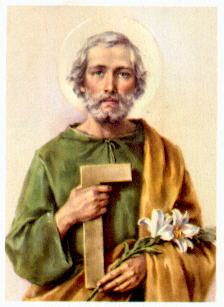
St Joseph the Worker - 1st May
St Joseph has two memorials. On 19th March, he is remembered principally as the earthly spouse of Our Lady and hence the adoptive father of Jesus. On 1st March, he is remembered specifically as the patron of all workers. He has many patronages (apart from workers), including Canada, and is regarded as the Protector of the Church. Joseph is often depicted with carpenter's tools and/or with a lily.
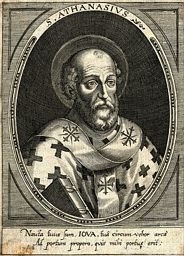
St Athanasius - 2nd May
St Athanasius (c296 - 373) was born in Alexandria of Christian parents. As a deacon, he accompanied his bishop to the Council of Nicea (325). After he became bishop in 328, Athanasius fought vigorously to uphold the dictates of the Council, especially its condemnation of the Arian heresy. This stance was strongly opposed in some quarters and Athanasius suffered numerous exiles and persecutions. Throughout his tribulations, he was supported by the Western Church and the papacy.
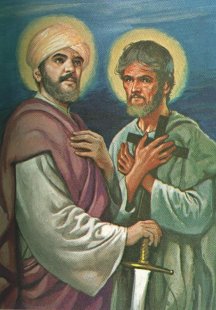
Ss Philip and James - 3rd May
St Philip and St James the Lesser (Younger) are traditionally commemorated on
the same day (formerly 1st May)
St Philip, who was born at Bethsaida, was first a disciple of John the Baptist
before joining the apostolic band. Little is known about him, but scriptural
episodes give the impression of a shy, naive, practical individual. He is
said to have preached in Greece and Asia Minor before suffering martyrdom at
Hierapolis in Phrygia in c.80. He is the patron of Luxembourg and Uruguay
(as well as of pastry chefs).
St James the Lesser, one of the Apostles, was the son of Alphaeus. He is
sometimes equated with the James whose mother was present at the crucifixion
and "James the brother of the Lord" who saw the risen Christ. He is also said
to have been the first Bishop of Jerusalem. He may also have been the author
of the Epistle of St James. None of these identifications is certain. He is
said to have been beaten to death (c.62) with clubs after having been thrown
from the pinnacle of the Temple. He is joint patron (with St Philip) of
Uruguay and is the patron saint of fullers and pharmacists.

Juliana of Norwich - 8th May
Juliana (or Julian) was born in c1342 and died of natural causes in c1423).
Almost nothing is known of her early life; we don't even know if she was from
Norwich or chose to move there. She may have been a Benedictine nun and became
a recluse under the direction of Benedictines in Norwich. She was a mystic, visionary
and writer. Her book, Revelations of Divine Love, which contains sixteen revelations
she received while in an ecstatic trance, is still in print. She meditated on, spoke
on, and wrote on the power of love of evil, Christ's Passion, and the nature of the
Trinity. In her early 60s she shut herself in complete seclusion at Conisford, Norwich,
and never left again.
Juliana of Norwich was never formally beatified but is considered "blessed" due to
popular devotion.
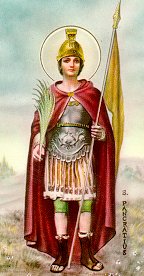
St Pancras - 12th May
No lover of London's railway termini could fail to mention St Pancras (died c.304), whose feast day occurs on 12th May. The name of the station derives from the nearby parish church. St Pancras is said to have been a Roman martyr, who died in about 304. St Augustine dedicated a church at Canterbury to him.
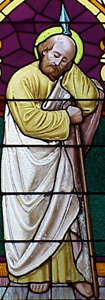
St Matthias - 14th May
(St Matthias may also be commemorated on 24th February). After the Ascension
of Our Lord, His followers at Jerusalem chose a replacement for Judas. The man
chosen was Matthias, "and he was numbered with the Eleven." Apart from the
information given in the first chapter of Acts, nothing is known of him.
It would be a mistake to conclude from this that he was a failure and a bad
choice as an apostle. We know as much as we do about Peter and Paul because
Luke (a travelling companion of Paul) wrote extensively about them. About most
of the other apostles (those belonging to the original twelve and later ones
like Matthias) we know little after Pentecost on an individual basis.
O Almighty God, who into the place of Judas didst choose thy faithful servant
Matthias to be of the number of the Twelve: Grant that thy Church, being
delivered from false apostles, may always be ordered and guided by faithful
and true pastors; through Jesus Christ our Lord, who liveth and reigneth with
thee, in the unity of the Holy Ghost, one God, now and for ever. Amen
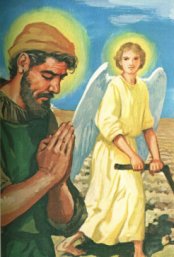
St Isadore the Farmer - 15th May
St Isadore of Seville was noted last month, and this month we acknowledge the other Spanish St Isadore (1070 - 1130). He was born in Madrid, and became a pious farmer. He was married to Saint Mary de la Cabeza. Their son died young and, convinced it was the will of God that they not have children, they lived together celibately the rest of their lives, doing good works. Accused by fellow workers of shirking his duties by attending Mass each day, taking time out for prayers, etc., Isidore claimed he had no choice. One tale says that when his master came in the morning to chastise him for skipping work or church, he found angels ploughing the fields in place of Isidore. Miracles and cures were reported at his grave.
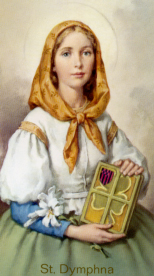
St Dymphna - 15th May
St Dympna, or Dymphna (7th Century), is commemorated on 15th May. She is said to have been the daughter of an Irish prince who fled to Gheel, in Belgium, to escape the incestuous advances of her own father. She is regarded as a patroness of the insane and a mediaeval foundation dedicated to her in the town of Gheel continues to do good work in caring for the mentally ill.
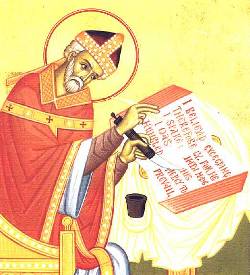
St Dunstan - 19th May
Dunstan (909 - 988) was educated at Glastonbury and spent much of his youth in the household of his uncle, Athelm, who was Archbishop of Canterbury. At one stage, he was exiled on charges of studying magic and paganism but, after a serious illness, he was ordained to the priesthood. For some time, he lived as a hermit near Glastonbury, practising the various handcrafts for which he was well-known. Ultimately, he was appointed Abbot of Glastonbury and did much to reform English monasticism along Benedictine lines. After Edgar's accession to the throne, Dunstan was appointed Bishop of Worcester, then Bishop of London and finally Archbishop of Canterbury. The coronation service which Dunstan devised for Edgar forms the basis of the service used today.

Ascension Day - 21st May, 2009
Grant, we beseech thee, Almighty God, that like as we do believe thy only-begotten
Son our Lord Jesus Christ to have ascended into the heavens; so we may also in
heart and mind thither ascend and with him continually dwell.
Book of Common Prayer

St Rita of Cascia - 22nd May
Rita (c1380 - c1457) was born near Spoleto, in Italy. As a girl, she expressed a desire to become a nun, but her parents arranged for her to be married at the age of twelve. She was a virtuous wife during eighteen years of marriage, though she was abused by her husband. She had two sons. The husband was killed in a brawl and the sons died soon afterwards. Rita then sought to enter the Augustinian convent at Cascia, and she was finally admitted in 1413. As a nun, she became well known for her penance and prayerfulness. In 1441, while meditating on the passion of Christ, she is said to have suffered a wound in the forehead, caused by a thorn. This wound would not heal. Rita died of tuberculosis, was beatified in 1626 and canonised as recently as 1900. Like St Jude, she is often invoked in desperate cases.
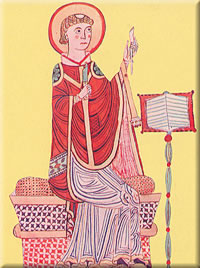
Bede of Jarrow - 25th May
Bede (673 - 735) enrolled as a monk at Jarrow, in Northumbria, in c682. He was a great scholar and prolific writer. He is said to have been the first to employ the initials "A.D." to signify the Christian era. He is also the only Englishman to be named by Dante in his Divine Comedy. He is the only Englishman to have been acknowledged by the Roman Church as a "Doctor of the Church".
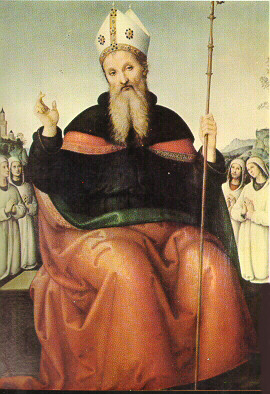
St Augustine of Canterbury - 27th May
Augustine (died c604) was born in Italy and was chosen in 596 by Pope Gregory the Great to lead an evangelistic mission to England. He and thirty monks anded at Thanet, off the Kentish coast, in 597. Augustine was made very welcome by King Ethelbert of Kent, who was baptised later that year. Augustine returned to the Continent to be consecrated bishop, and on his return chose to establish his cathedral (Britain's first) at Canterbury, rather than London. He was very successful in attracting converts in the south of England, but less successful in gaining the co-operation of Christians in other parts of the country. In art, he is often depicted baptising a king.
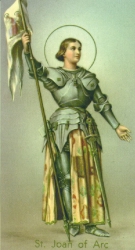
St Joan of Arc - 30th May
Joan of Arc (1412 - 1431) , was a victim of Anglo-French political intrigue in the 15th Century. She was not canonised until 1920 and, with St Therese of Lisieux (canonised in 1925), is joint patroness of France.
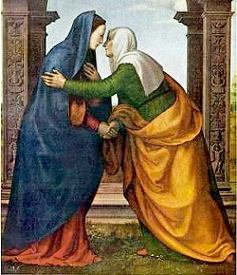
The Visitation - 31st May
Eternal Father, you inspired the Virgin Mary, mother of your Son, to visit Elizabeth and assist her in her need. Keep us open to the working of your Spirit, and with Mary may we praise you forever.
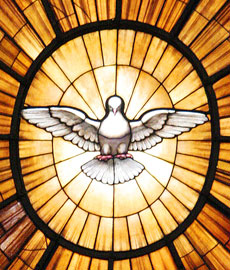
The Day of Pentecost, or Whitsunday - 31st May, 2009
Father of light, from whom every good gift comes, send your Spirit into our lives
with the power of a mighty wind, and by the flame of your wisdom open the horizons of our minds.
Loosen our tongues to sing your praise
in words beyond the power of speech, for without your Spirit
man could never raise his voice in words of peace
to announce the truth that Jesus is Lord,
who lives and reigns with you and the Holy Spirit,
one God, for ever and ever. Amen.
Roman Missal